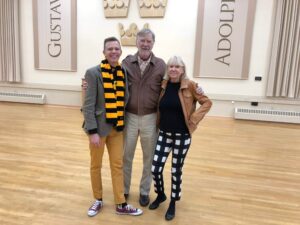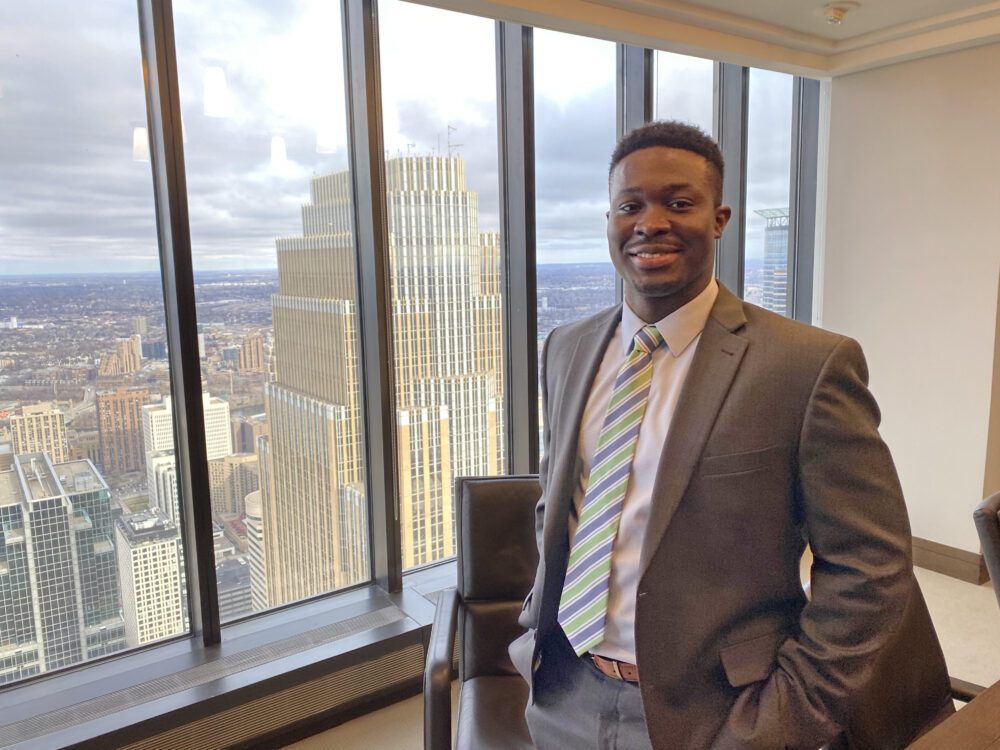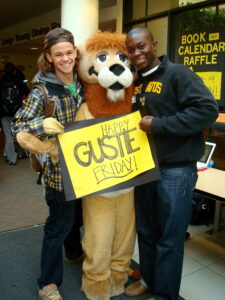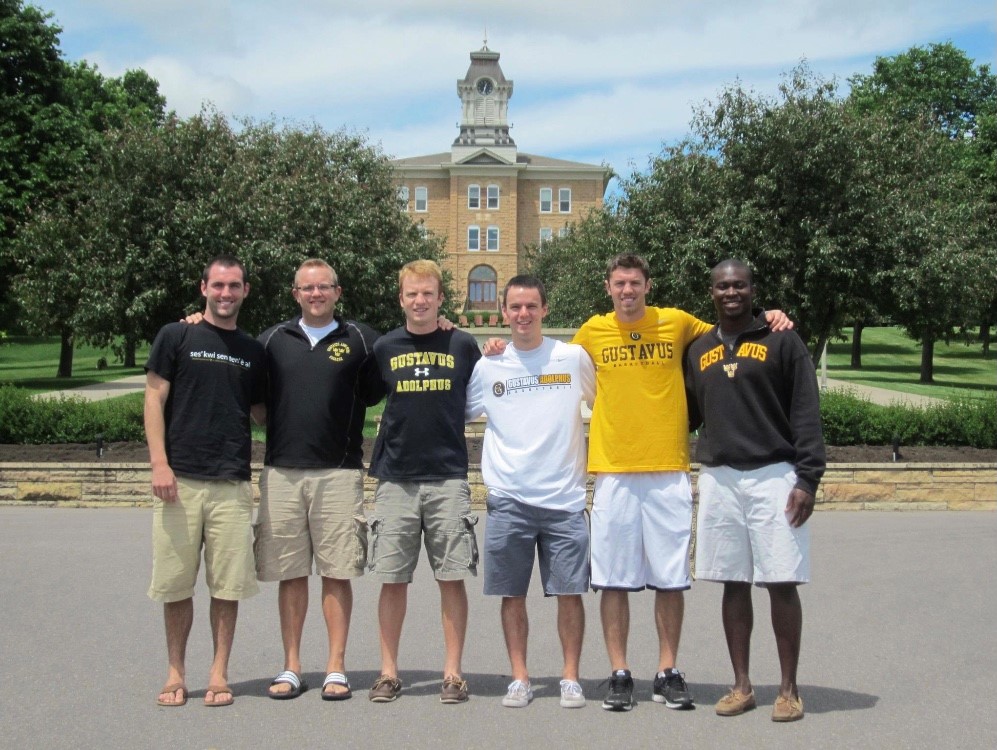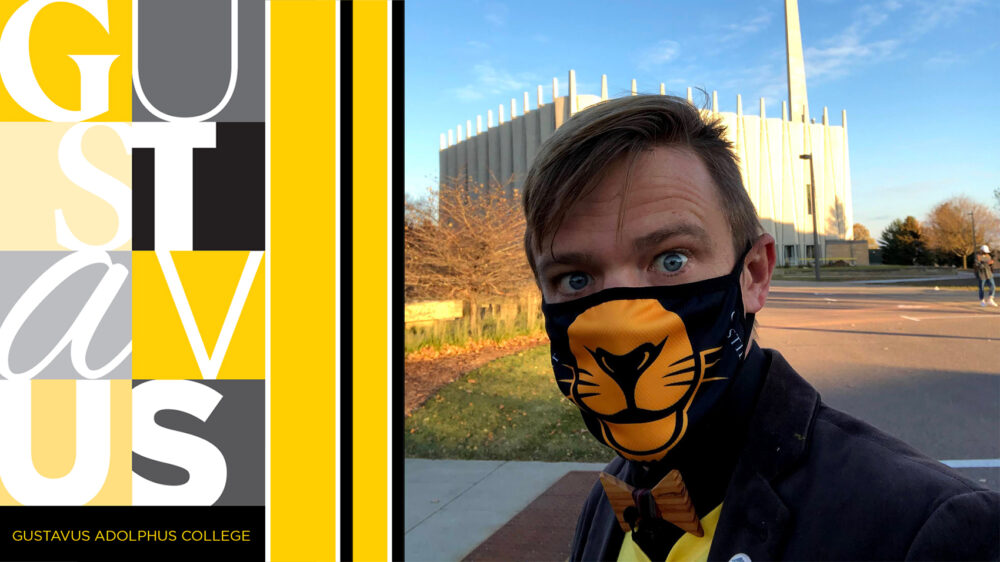
by Dana Melius
Tane Danger—yes, that is his real name—bursts with excitement.
Listen to those who recently played a role in hiring Danger, a communication studies graduate—and how that energy and excitement has touched others he’s bounded into during a diverse public policy career in the Twin Cities—and you’ll catch a sense of both his drive and entrepreneurial spirit. After leading a Twin Cities improv group for the last decade, the 2007 Gustavus alum was recently named director of the popular Westminster Town Hall Forum in Minneapolis.
For more than 40 years, the Westminster Town Hall Forum has brought world-renowned speakers and writers to Minneapolis “to engage the public in reflection and dialogue on the key issues of our day from an ethical perspective.” Past speakers have included Archbishop Desmond Tutu, former Vice President Al Gore, Maya Angelou, and Gwen Ifill.
“He was born for this role,” says Megan Dayton, chair of the Forum Advisory Board that led the search for a new director of the 40-year-old public policy forum held in Westminster Presbyterian Church.
“I’m super excited,” Dayton added. “We’re just thrilled to have him. He’s full of energy.”
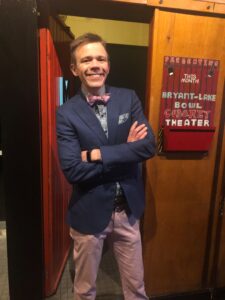
Danger at Bryant Lake Bowl, where T2P2 regularly offers improv-based civics lessons to sellout crowds.
That creative energy Danger is full of is in part due to nearly a decade as co-founder of The Theater of Public Policy (T2P2), which the Star Tribune once referred to as “C-Span being swarmed by the cast of SNL (Saturday Night Live),” adding that “Tane Danger is on a mission to make good things fun.”
Danger himself called his group “Minnesota’s best loved, most successful, and coincidentally only civics-inspired improv comedy company.” Since 2011, Danger’s goal was to add some excitement to “interviewing newsmakers.”
But Danger’s early dive into theatrical fun came first during his undergraduate studies at Gustavus, where he founded the LineUs Improv Comedy Group. While he admits that serious theatre arts students often wondered what these improvisational efforts were and why they might be drawing bigger crowds—as in “Who are these yucksters going up and doing whatever they want?”—Danger loved it.
“That’s one of the wonderful things about Gustavus,” Danger says. “It’s a place where you could come up with your own ideas…and then do it.”
But there was also a serious side to Danger’s collegiate days; he served two years as editor of the Gustavian Weekly, which later prompted a couple years writing for the Mankato Free Press.
And “the value of rhetoric and truth” rings particularly important in today’s world, in these moments, he noted.
“It was learning in real time on how to engage in real issues. I learned a lot during that time. It’s still a huge underpinning of everything I do,” Danger said. “Gustavus was really where I learned the importance and value of working together to achieve a better world…We have to be able to actually talk to each other.”
That has been particularly important after issues which rocked the political and social justice world during 2020.
“We’re coming up on the one-year anniversary of the George Floyd murder,” Danger stressed. “I feel morally compelled to be spotlighting voices of conscience on racial justice issues a year after that horrible event. I believe that the whole world is going to be noting that day on May 25th.”
Dayton says Danger is perfect for the Forum director position, for “the fact that he’s been doing essentially this work his entire career.”
“He’s incredibly energetic and full of ideas,” she said. “He’s a good connector, with ideas.”
In his role as director of the Westminster Town Hall Forum, he’ll be able to continue those dives into serious public policy issues and discussions. The Forum events, which traditionally drew crowds to the historic Minneapolis church at 1200 South Marquette Ave., have been holding virtual discussions during the pandemic.
The Forum’s first first three speakers booked for 2021 include Dr. Ayana Elizabeth Johnson (January 28), noted marine biologist who “works at the intersection of climate, policy, and race”; Barbara Coombs Lee (March 23), a respected end-of-life advocate for “compassion and choice”; and Walter Isaacson (April 20), former president/CEO of the Washington, D.C.-based Aspen Institute and editor of Time.
“My parents were pretty much pushing Gustavus,” Danger admits. And after growing up in southeast Florida, the “go someplace different” pep talk worked. And he’s glad it did.
“I really do think that Gustavus was a big part of why I am and where I am,” he says. “I’m really a booster for the liberal arts education.”
Awarded a Bush Fellowship in 2014, he earned a master’s in Public Policy at the University of Minnesota’s Humphrey School. Danger also hooked up with the U of M’s School of Design and taught a new course, “Improvisation for Design.”
Danger is currently is all over the Twin Cities in a variety of unique public policy avenues. He’s also been a contributor to the popular public affairs show “Almanac” on public television, hosted the Give to Gustavus Day fundraising event, and works with Metro Transit on a fun, educational web series called, “Hey! Where Does This Bus Go?,” talking to riders in pure improv fashion.
But now it’s a slight detour into the Town Hall Forum role. And he’s driven again and excited.
“My job today is keeping up on current events, and it’s to be building relationships in the community. And a fundraiser. And a writer. It’s a million and one different things, which is what a liberal arts education helps bring out. It provides a powerful background,” Danger stressed.
“I love working on things that really matter, as squishy as that sounds.”
